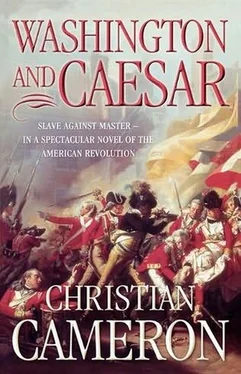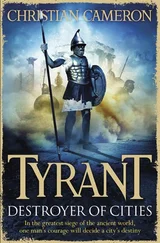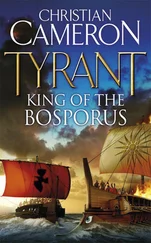Christian Cameron - Washington and Caesar
Здесь есть возможность читать онлайн «Christian Cameron - Washington and Caesar» — ознакомительный отрывок электронной книги совершенно бесплатно, а после прочтения отрывка купить полную версию. В некоторых случаях можно слушать аудио, скачать через торрент в формате fb2 и присутствует краткое содержание. Год выпуска: 0101, ISBN: 0101, Издательство: HarperCollins, Жанр: Исторические приключения, на английском языке. Описание произведения, (предисловие) а так же отзывы посетителей доступны на портале библиотеки ЛибКат.
- Название:Washington and Caesar
- Автор:
- Издательство:HarperCollins
- Жанр:
- Год:0101
- ISBN:9780007389698
- Рейтинг книги:3 / 5. Голосов: 1
-
Избранное:Добавить в избранное
- Отзывы:
-
Ваша оценка:
- 60
- 1
- 2
- 3
- 4
- 5
Washington and Caesar: краткое содержание, описание и аннотация
Предлагаем к чтению аннотацию, описание, краткое содержание или предисловие (зависит от того, что написал сам автор книги «Washington and Caesar»). Если вы не нашли необходимую информацию о книге — напишите в комментариях, мы постараемся отыскать её.
Washington and Caesar — читать онлайн ознакомительный отрывок
Ниже представлен текст книги, разбитый по страницам. Система сохранения места последней прочитанной страницы, позволяет с удобством читать онлайн бесплатно книгу «Washington and Caesar», без необходимости каждый раз заново искать на чём Вы остановились. Поставьте закладку, и сможете в любой момент перейти на страницу, на которой закончили чтение.
Интервал:
Закладка:
“He has had the effrontery to send me a perfectly odious letter, suggesting that my interest in the veterans’ grants in Ohio is all self-interest-that I have attempted to cheat him and others of my former officers. Utter rot. It sticks in my craw, madam.”
She turned her head slightly, at the pistols in the case on the desk.
“Washingtons don’t fight Muses, my dear.”
He looked confused for a moment. Then he saw it. She thought the cleaning of the pistols went with the letter.
“I won’t fight him unless he calls me. But I’ll write him such a letter, and make my feelings plain. To bear such an affront is beyond me. I’m speechless.”
“You are not, dear. Come to bed.”
“I think I will read, madam, if only for a bit.”
“I’ll wait for you, then.”
She came and kissed him, a social kiss, and his temper cooled some, but just the sight of the letter on his desk made his pulse race again.
The room was cold, despite the fire, and the girl hadn’t really done much but stir the coals and add logs that hadn’t caught. He crossed the room in front of his desk and pushed the logs around until they made a blaze, smiled to think of Martha and her wit, and went to his wall of books, looking for an old friend to calm his mind. He knew that George Mason and other more learned men turned to the ancients in moments such as these. He’d never really learned his Latin and now he regretted it, because they were farmers as well as soldiers.
Another packet on his desk brushed at his attention, and with deep pleasure he withdrew careful drawings of a plow from England, with a letter from a scientific farmer there. The letter and close consultation on the plow eased him out of the worst of his temper; fifteen minutes’ study required to understand the harness and he was quite ready to face her again, and bed.
It was a troubling time. He woke with the specter of Muse’s letter in his mind, and it stayed with him as he was shaved and had his hair prepared by his valet. It left him sharp all day although it couldn’t contend with the cares of the estate. He was up with the dawn, and an hour later ahorse with nothing but a cup of chocolate in him, riding down the lane to see his farms with a small staff of men behind him: two slaves, Bailey, and a secretary. All the men were working. Washington noted with surly pleasure that the herring nets were out on two farms, and the work of repair and restoration going along smartly. He handled the English-made linen twine himself; experiment had shown that there was no substitute for it, despite the relative expense and the trouble of keeping it stocked. Prices for herring were falling, but the fishery provided a reliable cash crop that cost him nothing but net repair and the labor of slaves. If no one bought the fish, he could feed all his farms on them for the whole year, although that might require more clay for jars. He jotted a note in his daybook.
Twice he met neighbors on the road. Both made sure to congratulate him on Jack’s marriage, and both asked if he would hunt the next day, or if preparations for the wedding would keep him away. He smiled at both and gave nothing away, although most of his acquaintance knew he felt ill-used in the matter. He did the civil thing, and assured both gentlemen that he would indeed hunt, and that his dogs (the best dogs in the county, except perhaps the Fairfax pack) would be at their service. Both men commended him on the slave Caesar. This didn’t entirely please him. Something about the boy irritated him; he did not wish to be unfair, and that annoyed him the more.
Caesar worked with a will, washing every dog in the pack, even the gun dogs that would spend the next morning at home. He was not in his fine clothes; he was dressed in a pair of cast-off breeches and an evil cotton shirt of a weave so coarse that he could feel the sun right through it on his back.
Old Blue was better-there couldn’t be much doubt of that, although whether the mineral or the broth baths or her own animal constitution saved her was open to question. He washed her and scratched her head; of all the dogs, he now knew her the best. He wondered if she’d take the pack from the temporary leader now that she was back-whether they’d fight (not likely) or if some hidden signal of speech would pass between them, like him and Pompey, where the fight was just the symbol of the thing.
When the dogs were clean, he changed their straw, mucked out the kennel until it was as clean as Queeny’s cabin, swept the front of the building, and put water out for all the dogs. He was just yoking up a second pair of buckets in the yard by the stables when the Master came riding down the road between the overseer’s house and the new dung pit. Most of the slaves went right on with their tasks, which was odd to Caesar. In Jamaica, they would all have stood and tugged their forelocks until the Master passed. But this was a freer place, so he raised his face and smiled before realizing that he had been warned against just such, by both white and black. It caused an odd spasm to cross his face, which stopped his master in his tracks.
“Bailey, find out what Julius Caesar means by that long face of his.”
“Stop there, boy.”
Caesar stood in confusion, knowing he was in the wrong but resentful, as well. He was only seeking to please, even if that thought didn’t sit well. He kept his buckets on the yoke and his head down. This generally worked in Jamaica.
“I saw that look, Caesar. What did you mean by it?” Bailey sounded more concerned than angry. He was reputed a fair man among the blacks, not like some awkward bastards they all knew.
A few seconds gave Caesar all the time he needed.
“Yoke bit mah shouldah, suh.” He raised his eyes for a moment, then back down. “I did’n mean no ha’m.”
Queeny had ordered him to stop speaking his “new way”. It didn’t please him, and he practiced in secret, both the language of his master and the language of the pulpit. But it seemed to work on Bailey, who was more relaxed with him when he spoke like the rest of the men.
Bailey rode back to Washington. “I think he had a spasm, sir.”
Washington watched the boy hike his buckets again as if seeking comfort, and a little water trickled out of each and ran off into the dust.
“I cannot abide rebellion, Mr. Bailey. But I’ll let this pass.”
Bailey could only put it down to temper. His employer never watched the blacks like some white men Bailey had known, and there was little rebellion to be found at Mount Vernon. Bailey suspected that most slaves were as smart as he-smart enough to know that they would not be as comfortable anywhere else if they were sold from Mount Vernon. The African boy was no more a rebel than the others, but the big man on the horse was in a foul temper, and he didn’t seem to like the dogs boy at the best of times. Bailey wondered why. The boy was quite clearly gifted, and everyone else on the farm knew it.
Martha Custis, as she was then, had two children by Jack Custis before he died and she became Mrs. Washington. He loved them both, though Patsy had been frail and Jack was the very model of a wild rich boy. As Jacky got older and more spoiled by his mother, his demands on his estates grew larger, until Washington had separated them off from the other Custis and Washington holdings so that Jack could only affect his own. But this separation had been on paper only, and the final books that would allow a grown-up and married Jack Custis the full enjoyment of his own estates were a difficult and unrewarding task. Washington didn’t resent the loss of revenue. It was nothing as simple as that. He had enjoyed commanding one of the largest sets of estates in Virginia, and he would miss many of the useful details from Jack’s land. Among other details, Jack had the best farrier in Virginia, and now Washington would have to pay to use him.
Читать дальшеИнтервал:
Закладка:
Похожие книги на «Washington and Caesar»
Представляем Вашему вниманию похожие книги на «Washington and Caesar» списком для выбора. Мы отобрали схожую по названию и смыслу литературу в надежде предоставить читателям больше вариантов отыскать новые, интересные, ещё непрочитанные произведения.
Обсуждение, отзывы о книге «Washington and Caesar» и просто собственные мнения читателей. Оставьте ваши комментарии, напишите, что Вы думаете о произведении, его смысле или главных героях. Укажите что конкретно понравилось, а что нет, и почему Вы так считаете.












